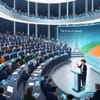The Paris AI Summit has sparked intense debate on AI safety and regulation. US Vice President JD Vance's speech emphasized the need for a lighter regulatory touch, warning that "excessive regulation" could stifle innovation and hinder US dominance in the field. This stance was echoed by French President Emmanuel Macron and EU President Ursula von der Leyen, who vowed to "cut red tape" and promote a more innovation-friendly approach.
However, not everyone shares this view. Anthropic CEO Dario Amodei expressed disappointment that the summit didn't adequately address AI safety concerns, citing the need for international cooperation to mitigate the technology's risks. The UK's decision not to sign the summit's declaration, citing concerns over national security and the need for more practical clarity on global governance, has also raised eyebrows.
China's presence at the summit was notable, with the country signing onto the declaration and positioning itself as a leader in AI governance. The Global South was also well-represented, with many countries signing onto the declaration.
The summit's outcome has been met with mixed reactions. Some experts see the declaration as a welcome shift away from the "AI safety" rhetoric and towards a more nuanced approach that balances innovation with responsibility. Others, however, argue that the summit missed an opportunity for more meaningful progress on global AI governance.


